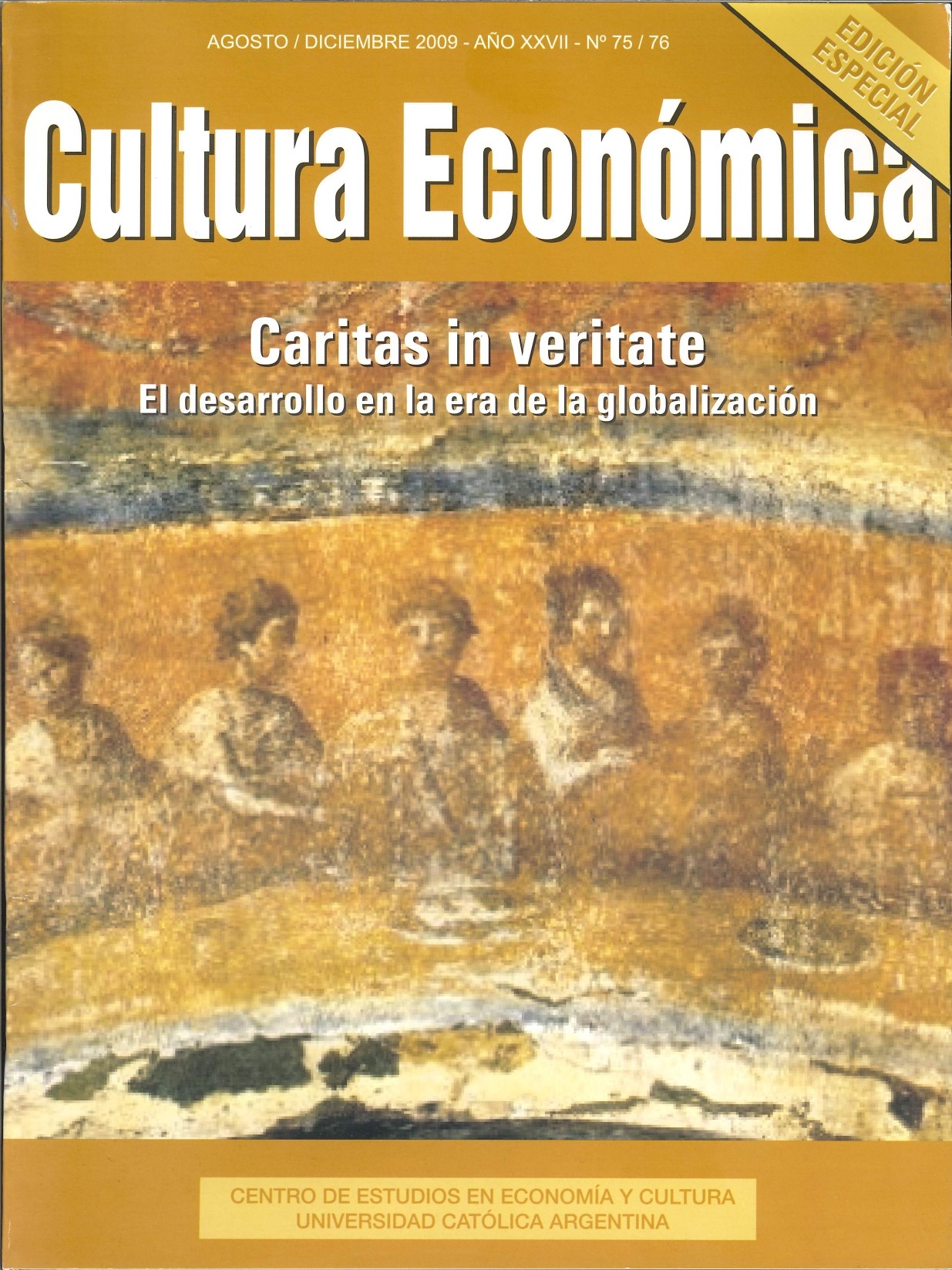Hacia el paradigma del don
Palabras clave:
don, objetivismo, personalismo, creacionismo, mercadoResumen
El autor presenta dos enfoques para interpretar las relaciones de don en entornos de mercado propuestas por la Encíclica. Por un lado, explica los supuestos del “objetivismo social”, caracterizado por los principios de equivalencia, no-tuismo, predictibilidad y opacidad sostenido
por neoclásicos, estructuralistas y desconstructivistas. Por otra parte, presenta los argumentos de filósofos personalistas y economistas contemporáneos a favor de un enfoque “creacionista” y “personalista” de la donación, basado en la apertura al otro, la agencia libre y la relacionalidad.
Descargas
Citas
Adorno & Horheimer (1947) Dialectic of Enlightment, Stanford University Press, Stanford.
Adorno, T. W. (1944), Minima Moralia, Verso, Londres.
Akerloff, G. (2000), “Economics and Identity”, The Quarterly Journal of Economics, The MIT Press, Vol. 115, No. 3, pp. 715-753.
Becker, G. (1991), A Treatise on the Family, Cambridge, MA: Harvard University Press.
Belk, R. W. y Coon, G. S. (1991), “Can’t Buy Me Love: Dating, Money and Gifts”, Advances in Consumer Res., 18 (1991), pp. 521-7.
Beretta, S. (2009), “Los modelos de regulación de los mercados financieros: el mensaje de la Encíclica” en Cultura Económica, Agosto-
Diciembre 2009, pp. 44-59.
Bourdieu, P. (1976), “Les modes de domination”, Actes de la recherche en sciences sociales, 2, pp. 122-32.
Bruni, L. (2007), Reciprocità, Mondadori, Milano.
Davis, J. (2003), The theory of the individual in economics: identity and value, Advances in social economics, Routledge, Londres.
Derrida, J. (1991), Donner le temps, 1. La fausse monnaie, Galilee, Paris.
Dilnot, C. (1993), “The Gift”, Design Issues, Vol. 9, No. 2, (Autumn, 1993), pp. 51-63.
Fehr, E & Falk, A., (1999), “Wage Rigidities in a Competitive Incomplete Contract Market”, Journal of Political Economy 107, pp. 106-134.
Gregory, C. A. (1982), Gifts and Commodities, Academic Press, Londres.
Guenther, L. (2006), The Gift of the Other, Levinas and the politics of reproduction, State University of New York Press, Nueva York.
Gui, B. y Sugden, R. (eds) (2005), Economics and Social Interaction: Accounting for Interpersonal Relations, Cambridge University Press, Cambridge.
Hargreaves Heap, S. (2001), “Expressive Rationality. Is Self-worth Another Preference?” en Uskali Maki (2001), The economic world view: studies in the ontology of economics, Cambridge University Press, pp. 98-113.
Husserl, E. (1970), The Crisis of European Sciences and Transcendental Phenomenology. An Introduction to Phenomenology. Northwestern
University Press, Evanston, IL.
Hyde, L. (1979), The Gift: Imagination and the Erotic Life of Property, Vintage, Nueva York.
Kolm, S. C. y Ythier, J. M. (2006), Handbook of the Economics of Giving, Altruism and Reciprocity: Foundations, Elsevier, Amsterdam.
Levinas, E. (1969), Totality and Infinity. An Essay on Exteriority, Duquesne University Press, Pittsburgh.
Marion, J. L. (2002), Being Given: Towards a Phenomenology of Giveness, Stanford University Press, CA.
Marion, J. L. (1989), Réduction et donation, PUF, Paris.
Marion, J. L. (2004), In Excess: Studies on Saturated Phenomena, Fordham University Press, Nueva York.
Mauss, M. (1925), The gift: the form and reason for exchange in archaic societies, trans. W. D. Halls, 1990, Routledge, Londres.
Offer, A. (1997), “Between the Gift and the Market: the Economy of Regard”, The Economic History Review, New Series, Vol. 50, No. 3, (Aug., 1997), pp. 450-476.
Osteen, M. (2002), The question of the gift: essays across disciplines. Routledge, Reino Unido.
Ricoeur, P. (1969), Le conflit des interprétations. Essais d’herméneutique, Éditions du Seuil, Paris.
Ricoeur, P. (1990), Soi-meme comme un autre, Éditions du Seuil, París.
Ricoeur, P. (2002), “La lutte pour la reconaissance et l’ economie du don”, Conference Première Journée de Philosophie à l’UNESCO, 21 de Noviembre 2002.
Sako, M. (2006), “Grand Challenges in Services”, GCS Workshop, Said Business School, Oxford.
Solow, J. L. (1993), “Is It Really the Thought that Counts-toward a Rational Theory of Christmas?”, Rationality & Society, 5 (1993), pp. 506-17.
Tournier, P. (1963), The Meaning of Gifts, trans. John S.Gilmour, Richmond, VA.
Zamagni, S. (ed.) (1995), The Economics of Altruism, International Library of Critical Writings in Economics Series, Aldershot.
Descargas
Publicado
Cómo citar
Número
Sección
Licencia













